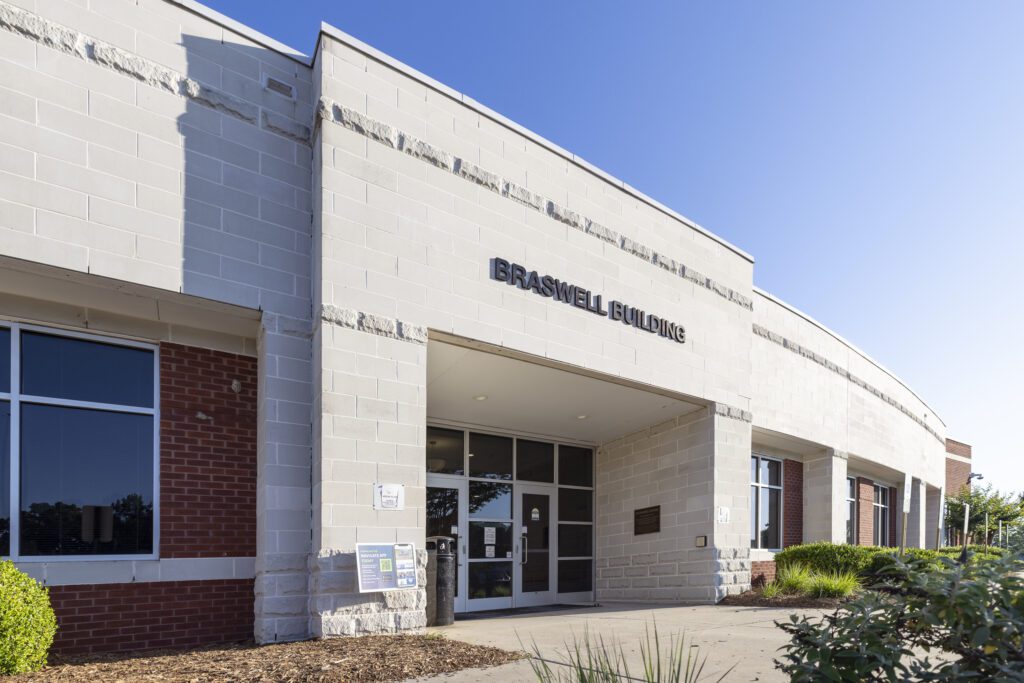Save Lives as a Surgeon’s Right Hand
Surgeons can’t do their job alone. They need a solid team of professionals around them to help every surgery run smoothly and efficiently.
That’s where surgical technologists come in. As a Surgical Technology student at South Piedmont, you’ll learn how to prepare the operating room, select the correct surgical tools, and ensure a sterile environment.
You’ll learn from experienced faculty members in our state-of-the-art Surgical Technology lab and complete your clinical training at our partner sites right here in Anson and Union counties.
Ready to cut into a great career field? Let’s get to work.
The South Piedmont Community College Surgical Technology Program is accredited by the Commission on Accreditation of Allied Health Education Programs (www.caahep.org) upon the recommendation of Accreditation Review Council of Education in Surgical Technology and Surgical Assisting.
Graduates of CAAHEP-accredited programs are eligible to apply for the National Board of Surgical Technology and Surgical Assisting (NBSTSA) Certified Surgical Technologist (CST) examination, pending proof of graduation.
The Program Options
Mode
In-person
Prerequisites
BIO 168, BIO 169, BIO 275, TEAS score of at least 65
6:1
Average student-to-teacher ratio for Surgical Technology classes. You will receive personalized instruction here!
Hands-On
You’ll get hands-on experiences in our simulation lab beginning on your first day in the program.
Local
You’ll have clinical training opportunities at hospitals and healthcare providers in Anson and Union counties.
FAQ/Admissions Booklet & Handbook
View our admissions booklet and Surgical Technology program handbook here.
You will learn to prepare surgical equipment, assist surgeons, manage instruments and supplies during each surgical procedure, assist in caring for surgical patients, and collaborate and effectively communicate with other members of the surgical team.
You must have successfully completed BIO 168, BIO 169, and BIO 275, and have a TEAS score of at least 65.
- Viewing the online Information Session is a requirement for admission into the Surgical Technology program.
- After you have watched the Information Session, you must complete the Surgical Technology Application Request Form. A member of our admissions team will contact you regarding the Phase II Surgical Technology Program Application after you submit the form.
- You must provide all required supporting documentation with the submission of the Phase II application to healthadmissions@spcc.edu.
To prepare entry-level surgical technologists who are competent in the cognitive (knowledge), psychomotor (skills), and affective (behavior) learning domains to enter the profession.
- Apply knowledge of anatomy, physiology, pathophysiology, pharmacology, microbiology, and legal obligations to the responsibilities of a surgical technologist.
- Exhibit professionalism and cultivate a surgical conscience through the practical application of the AST’s Code of Ethics and Code of Conduct in the field of surgical technology.
- Exhibit proficiency in both the principles and application of asepsis and sterile technique throughout the perioperative care of surgical patients.
- In clinical practice, display effective perioperative routines by illustrating prioritization, organization, and time management skills when participating in surgical procedures.
In order to perform the tasks required of any Allied Health Program, including Surgical Technology, certain capabilities are required. You must demonstrate the ability to perform required functions as a routine part of the classroom, laboratory, and clinical setting. You should be aware that successful completion of the Surgical Technology program and employability post-graduation will depend upon the ability to meet the following technical standards:
- Critical thinking: Possess critical thinking ability sufficient for clinical and class judgment.
- Ethical behavior: Provide services with respect for human dignity and the uniqueness of the patient unrestricted by consideration of socioeconomic status, personal attributes, or the nature of health problems.
- Legal behavior: Provide care within the scope of practice as stated in the Association of Surgical Technologist’s (AST) job description, code of ethics, professional code of conduct, and principles of surgical technology for the state of North Carolina.
- Interpersonal Skills: Possess interpersonal abilities sufficient to interact with individuals, families, groups, etc. from a variety of psychosocial cultural backgrounds.
- Communication skills: Effective communication is a cornerstone of success in the field of Surgical Technology. You must meet communication requirements to ensure you can confidently and accurately convey critical information in a surgical environment.
- Mobility: Possess physical abilities sufficient to move from room to room, maneuver in small spaces, stand and walk for extended periods of time and push/pull patients and/or large equipment from one place to another.
- Motor skills: Possess gross and fine motor skills sufficient to provide safe and effective patient care.
- Hearing skills: Possess auditory ability sufficient to monitor needs and collect data. You should have sufficient auditory acuity to communicate with team members, respond to verbal instructions from surgeons, and be aware of auditory cues during surgical procedures, including equipment and/or patient alarms.
- Visual skills: Possess visual ability sufficient for observation and data collection. Surgical technologists are responsible for intricate tasks, requiring keen visual acuity.
- Tactile skills: Possess tactile ability sufficient to master eye-to-hand coordination. Excellent hand-eye coordination is essential for successfully navigating the sterile field, passing instruments to surgeons, and assisting with various surgical tasks. You should exhibit the ability to synchronize visual information with manual dexterity, ensuring accurate and efficient assistance in the operating room.
- Weight Bearing: Possess the ability to lift and manipulate/move 40-50 pounds. Surgical technologists should be capable of lifting and carrying equipment and supplies, including surgical trays, with a reasonable amount of weight. This requires upper body strength and the ability to move and position heavy objects safely.
There are mechanical, electrical, chemical, and infectious material hazards in existence within the operating room setting. Infectious material hazards involve regular exposure to disease-bearing specimens, body fluids, wastes, and risk of blood-borne diseases from sharps injury or fluid splashes. Electrical and mechanical hazards exist in areas of equipment use including electrosurgical units, fluoroscopy (radiation), and surgical lasers. Chemical exposure exists in the operating room with sterilizing chemicals, cleaning supplies, waste anesthetic gases, and surgical specimen containment. Safety for the Surgical Technology students is provided in the form of personal protective equipment (PPE) and barrier precautions. Gloves, face shields, goggles, fluid resistant gowns, shoe covers, head covers, and masks are required PPE; radiation gowns and thyroid shields are barrier precautions. Additionally, the state of North Carolina requires each individual’s exposure to radiation to be measured and recorded; each student is required to wear a dosimetry badge that is provided by the program.
For the most up-to-date information regarding occupational risks, visit www.osha.gov/healthcare/hazards/.
This spot is reserved to display the annual report and examination results of graduates. This will be updated as required.
We Go Beyond the Basics
As a South Piedmont Surgical Technology student, you’ll learn the day-to-day skills you’ll need on the job, but also so much more.
We’ll ensure that you know how to prepare the operating room and select the right surgical tools. You’ll graduate with a foundational understanding of the vast array of surgeries that surgeons perform every day.
We’ll also make sure that you develop the communication and collaboration skills you’ll need to be a highly valued member of your surgical team. You won’t learn just how to do the job. You’ll learn how to do it at the highest level.




Preparation for a Meaningful Career
I love the Surgical Technology program because my teacher makes sure that I learn the essential skills and techniques required to excel as a surgical technologist. The main reason why I wanted to be a surgical tech is because I want to make a difference in patients’ lives. That’s what motivates me. I am quite proud of the fact that in my role as a surgical tech, I will be improving the health and wellbeing of others.
Jazmin Flores, Surgical Technology student and a resident of Monroe
Make the Most of Your Time at South Piedmont
Deepen your education by participating in our Enhanced Learning Opportunities.
Explore Similar Programs
Nursing
Medical Assisting
Or go back


